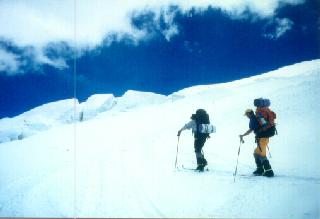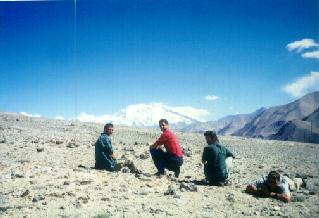PRACTICING CHI KUNG FOR HIGH-ATTITUDE MOUNTAIN CLIMBING
1 think chi kung helped me to get quicker acclimatization and to relax better after a hard day on the mountain. Especially the specific exercise you gave me to keep the body warm was very effective as we had often temperatures down to -30 degrees Celsius.
-- Dr. Paul Stocker

Dr Paul Stocker (right) climbing the Pamir Range
Dear Sifu Wong,
1 am a student of your fourth level chi kung course at Guttenstein, Austria. When we met last time 1 promised you to send a brief record about my experiences with chi kung concerning high altitude mountaineering.
Last summer four friends and I made a skiing-expedition to the 7546 meter high Muztag Ata, an ice-giant of the Pamir range in western China. For me it was the first time in climbing such a high mountain and 1 had been afraid of having not enough energy to be sucessful. We had about five months to train ourselves physically and mentally to be well prepared.
My friends, all very good mountain climbers, trained the hard physical way as it is usual. 1 had little time to do so, therfore 1 decided to do a light physical training and to trust in developing internal force by exercising chi kung two times a day for twenty minutes. At the end of the preparation we all had reached approximately the same level of power and endurance. 1 was quite surprised to see how easy it is to enhance the level of my force by practising chi kung regularly.
The expedition itself was successful for all of us. After two weeks on the mountain we all reached the peak and went back to the base camp by skiing. Practising chi kung in the high camps was not possible for me because of the extreme circumstances there, but the times in the base camp (4500m high) 1 tried to do the exercises regularly.

Dr Paul Stocker (second from left) at base camp with fellow climbers
Sometimes 1 observed strange effects during the exercises, like an immediate rise of power followed by strong dizziness, which 1 think was attributed to the energy level on the mountain. 1 think chi kung helped me to get quicker acclimatization and to relax better after a hard day on the mountain. Especially the specific exercise you gave me to keep the body warm was very effective as we had often temperatures down to -30 degrees Celsius.
Summing up 1 must say that chi kung is a very appropriate way for training in sports. By the way 1 want to tell you that at present the best female skier in the world, the Austrian Alexandra Meissnitzer, said that one of the secrets of her success was the practice of chi kung. 1 think the enhancement of vitality and the developement of internal force by chi kung help us to survive extreme situations without harm -- an important point concerning high altitude-mountaineering.
Out of my own experience 1 highly recommend chi kung as basic training for all sports and extreme adventures. And 1 would like to thank you for teaching me chi kung, which has become a precious part of my life. 1 shall be happy to see you again in Austria in May 1999.
Sincerely yours,
Paul Stocker.
Vienna, 1999-02-01.
